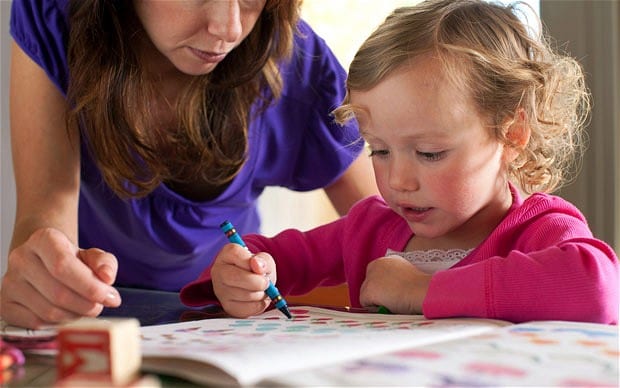Learning a Foreign Language: It’s Child’s Play for Today’s Toddlers in Britain
Say this for the European single market:It has got British preschoolers counting, “Un, deux, trois” in addition to “One, two, three.”
Before 1992, few children in Britain began to learn a foreign language before the age of 11.
But as the deadline approached for the first stage of European integration, “many parents started to feel that the learning of a foreign language was appropriate, and it is now recognized that the younger children learn languages the better,” said John Bartholomew, inspector for primary education in the London suburb of Richmond.
Traditionally, the second language taught in British schools has been French, and most of the language teaching initiatives among younger children echoes that, often for practical reasons.
“We didn’t choose French, it chose itself, because France is within easy reach and there’s a fairly accessible opportunity to use the language. You can even do a day trip to France,” said Mr. Bartholomew, whose language program in Richmond includes exchange trips for pupils andtraining for teachers in French schools.
Mr. Bartholomew and his colleagues have pioneered a French language teaching program in all 32 of the area’s primary schools, which teach children up to the age of 11. “We would like pupils to arrive at secondary school with basic confidence, motivation, and the awareness of the nature of different languages,” said Mr. Bartholomew.
Club Tricolore is an after-school initiative with 10 branches around London.
It is geared to four- to 11-year-olds, and with its sister club Tricolore Tots, a playgroup for two- and three-year-olds, it introduces children to a wholly French environment.
Largely through games and songs, and the regular appearance of ZoZo the French clown, youngsters quickly pick up the language, and an authentic accent.
According to Teresa Scibor, who set up and runs Club Tricolore, “children go away with a great sense of achievement, wonderful enthusiasm and confidence, which rubs off on other subjects.”
It is this enthusiasm which particularly appeals to many parents.
Ms. Scibor says her club is especially popular with parents who don’t want their children to be turned off about languages as teenagers, as they themselves often were.
“These parents were often hopeless at French in school, but recognize that languages are a passport to the future. They don’t want their children’s French to meet the same fate as theirs,” says Ms. Scibor.
Beth Worth, an American television executive who is based in London and a long-time Francophile, is considering sending her two-year-old daughter, Emily, to a French playgroup.
“I have struggled for years to reach an acceptable level of French,” she explains. “It would be wonderful if Emily could learn the language young enough to avoid all the pain.”
Research confirms that children younger than 11 are better mimics and suffer fewer inhibitions about speaking out and making mistakes than older children and adults.
OPAL Dunn, author of a book entitled “Help Your Children With a Foreign Language,”argues that six to eight years old is the perfect age range to put a child into a foreign language environment. “There’s a breakthrough after an amazingly short time,” she says.
However, the concentration on French, as opposed to other foreign languages, worries some experts in the field.
Christine Wilding, secretary-general of the Association for Language Learning, which represents language teachers, warns that “it is important that no one language dominates, because in English-speaking countries there is a need for diversity.There is no one language that a British person at work needs.
“In primary initiatives, French is being put in a more entrenched position. There is a danger that secondary schools could follow,” she added.
The Association for Language Learning recognizes the advantages of an early start, believing that younger learners display enthusiasm and are receptive to absorbing a new language.
But it stresses the need for a long-term government strategy, backed up by appropriate funding, to ensure that early foreign language teaching does not become piecemeal and divisive.
“We have to avoid establishing a policy too quickly without maintaining quality. And we obviously have to have a body to monitor what is going on in schools,” Ms. Wilding says.
She points to the growing trend among schools to bring in fee-paying clubs to satisfy parental demand for early French lessons.
Sinclair House School in London, a prep school for children from two and a half to eight years old,introduces pupils to French from thestart.
Every day, the two- and three-year-olds learn to recognize shapes, colors and simple instructions.
From fouryears on,Club Tricolore comes into the school to further the language skills of the youngsters, bringing a range of its own teaching materials.
“Parents expressed an interest in their children learning a language early and we responded. It has worked very well,” Elizabeth House, principal of Sinclair House School, says.
The British government has expressed a desire to see more language teaching in primary schools but is unlikely to introduce a formal strategy in England and Wales until its recent changes to the secondary school curriculum have settled down.
However, in Scotland, plans are well under way to have several languages taught to children under 11 by 1997. Pilot projects in schools have finished and the policy is being implemented.




